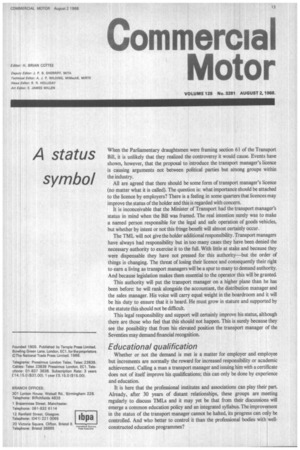A status symbol
Page 15

If you've noticed an error in this article please click here to report it so we can fix it.
When the Parliamentary draughtsmen were framing section 61 of the Transport Bill, it is unlikely that they realind the controversy it would cause. Events have shown, however, that the proposal to introduce the transport manager's licence is causing arguments not between political parties but among groups within the industry.
All are agreed that there should be some form of transport manager's licence (no matter what it is called). The question is: what importance should be attached to the licence by employers? There is a feeling in some quarters that licences may improve the status of the holder and this is regarded with concern.
It is inconceivable that the Minister of Transport had the transport manager's status in mind when the Bill was framed. The real intention surely was to make a named person responsible for the legal and safe operation of goods vehicles, but whether by intent or not this fringe benefit will almost certainly occur.
The TML will not give the holder additional responsibility. Transport managers have always had responsibility but in too many cases they have been denied the necessary authority to exercise it to the full. With little at stake and because they were dispensable they have not pressed for this authority—but the order of things is changing. The threat of losing their licence and consequently their right to earn a living as transport managers will be a spur to many to demand authority. And because legislation makes them essential to the operator this will be granted.
This authority will put the transport manager on a higher plane than he has been before: he will rank alongside the accountant, the distribution manager and the sales manager. His voice will carry equal weight in the boardroom and it will be his duty to ensure that it is heard. He must grow in stature and supported by the statute this should not be difficult.
This legal responsibility and support will certainly improve his status, although there are those who feel that this should not happen. This is surely because they see the possibility that from his elevated position the transport manager of the Seventies may demand financial recognition.
Educational qualification
Whether or not the demand is met is a matter for employer and employee but increments are normally the reward for increased responsibility or academic achievement. Calling a man a transport manager and issuing him with a certificate does not of itself improve his qualifications; this can only be done by experience and education.
It is here that the professional institutes and associations can play their part. Already, after 30 years of distant relationships, these groups are meeting regularly to discuss TMLs and it may yet be that from their discussions will emerge a common education policy and an integrated syllabus. The improvement in the status of the transport manager cannot be halted, its progress can only be controlled. And who better to control it than the professional bodies with wellconstructed education programmes?




































































































